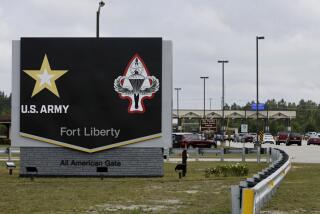Colorado Springs Takes Fate in Hand as Military Leaves : Diversification: Facing defense cutbacks, community leaders cast net for new industries ranging from high technology to nonprofit religious organizations.
- Share via
COLORADO SPRINGS, Colo. — For more than 30 years Joanne and Edward Colt have helped the military nourish its young, celebrate its victories and bid farewell to its heroes.
But recently, in this military town, the owners of Guiseppe’s Depot restaurant have looked for a new clientele, fearful that defense cutbacks could pull the economic rug out from under them, as have other businesses in Colorado Springs.
“When the economy went very flat, we started wooing the tour trade business,” Colt said, “We went from a complacent local business to really striving for more national business and recognition.”
As the Defense Department continues to scale back operations, this city that once depended primarily on the military trade has gone fishing for new industries, ranging from high technology to nonprofit religious organizations.
With a population of about 290,000, Colorado Springs is truly a military town, from the Air Force Academy on its northern border to Fort Carson Army post on the southern flank.
In between are the North American Aerospace Defense Command, which guards the nation’s skies; Peterson Air Force Base; Consolidated Space Operations Center; the Unified U.S. Space Command, and Falcon Air Station, which houses a key component of the Strategic Defense Initiative.
The city was founded by an Army general, William Jackson Palmer, who was captivated by the region’s beauty. To the west, he saw 14,110-foot snowcapped Pikes Peak, and sagebrush plains stretched to the eastern horizon.
Early on, Colorado Springs attracted so many wealthy residents of the East Coast and England that it became known as “Little London,” says Colorado Springs economist Mike Anderson.
It also became a haven for tuberculosis sufferers, who hoped the thin, dry air and high altitude would cure them. The city flirted with a gold-mining boom in the 1890s that was led by nearby Cripple Creek, but tourism carried the economy intermittently until World War II.
The city and the military entered their longstanding love affair in 1942, when Colorado Springs offered the Army 137,000 acres for the establishment of Fort Carson.
Over the next 30 years, the military added training centers and highly classified operations such as NORAD and the National Test Bed facility at Falcon Air Station.
Military influence reached its peak, Anderson said, at the height of the Vietnam War.
About 90% of the economic base was attributed to the military in 1970, he said.
Although the marriage worked well, city leaders realized then it likely wouldn’t last and began crafting a game plan to broaden the economic base by luring high-tech firms to Colorado Springs at a time when many weren’t even sure what high-tech meant, the economist said.
Between 1975 and 1983, the city’s manufacturing employment more than doubled.
“I think the reason we were so successful, we had the right combination of attributes,” Anderson said, citing a lack of organized labor unions, cheap labor, low tax rates and inexpensive real estate.
“We had the foresight, and we were extremely successful in bringing the firms in, defense as well as nondefense.”
By 1980, the city’s economic base shifted to the percentages it has today--defense and military represent 60%; high technology 30%; and tourism 10%.
But the 1980s also were some of the most volatile in the city’s economic history, with boom-bust factors turning Colorado Springs into a “yo-yo on a short string,” Anderson said.
In the early ‘80s, there was rapid growth in high-tech manufacturing industry, partially triggered by the nation’s defense buildup. Construction poured millions of dollars into the economy, and the military added the Consolidated Space Operations Center and formed the U.S. Space Command.
Those operations attracted a number of smaller firms which won contracts for jobs such as construction, hardware manufacturing and software development.
“Basically, it was the lining up, as I would put it, of the stars and the planets in our favor,” Anderson said. “Unfortunately, things started to unravel in the last half of the decade. It was really a bust for Colorado Springs.”
In the latter half of the ‘80s, the real estate market crashed and the semiconductor and high-tech industries began to slump.
New defense-related contracts failed to materialize. Many firms, including Texas Instruments, closed local operations, putting hundreds out of work.
In addition, the military began reducing its contingents in Colorado Springs.
In the face of these setbacks, economic developers continued to bring in new industries, posting job gains every year between 1975 and 1990.
In 1990, when some residents wondered if things ever would improve, MCI Communications and Apple Computer Corp. moved in, promising a combined 2,800 jobs by 1995.
Since then, others have settled here, including nonprofit religious organizations and telemarketing firms.
The jobless rate has improved, job growth has continued to post slight gains and construction is up.
Focus on the Family, a nonprofit organization that emphasizes “family values,” moved its headquarters from Pomona, Calif., here last year because of the city’s affordable housing and intelligent work force, said Paul Hetrick, vice president of Focus. It has about 900 workers in Colorado Springs.
“We have figured we are able to operate for several million dollars less a year than we could operate an equivalent organization in California,” he said.
In the Pomona area, an average house of three to four bedrooms would cost $250,000, compared with $100,000 or less here, he said.
The organization has a daily radio broadcast that airs on 1,800 stations nationwide.
Even the future of the defense industry doesn’t worry civic leaders much. “Here we are, seeing all this collapse in defense, and we’re actually seeing stability in employment,” said Rocky Scott of the Economic Development Council. “I think people are still going to be looking for that elusive peace dividend for a long time.”
More to Read
Sign up for Essential California
The most important California stories and recommendations in your inbox every morning.
You may occasionally receive promotional content from the Los Angeles Times.













